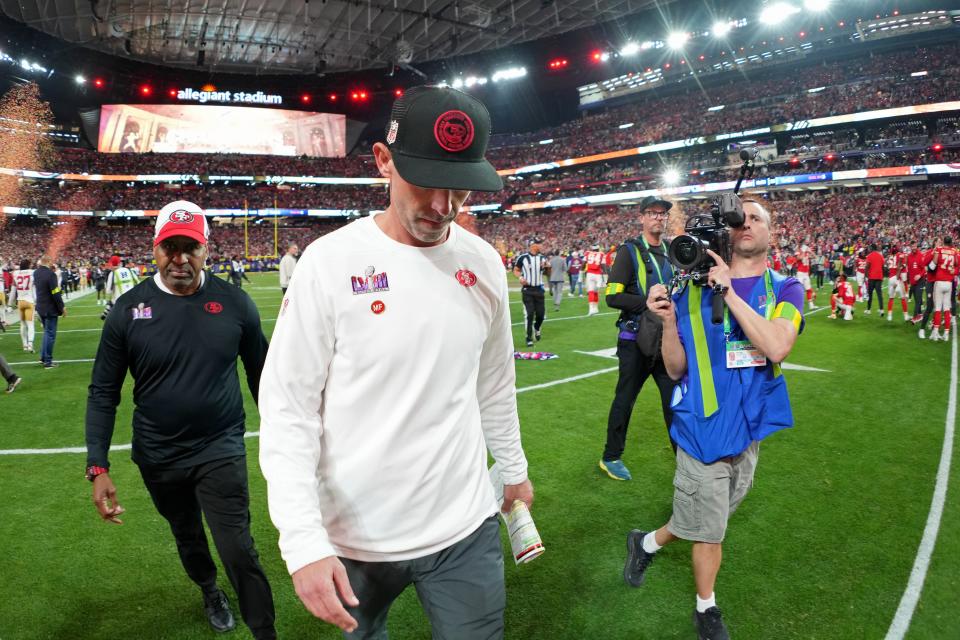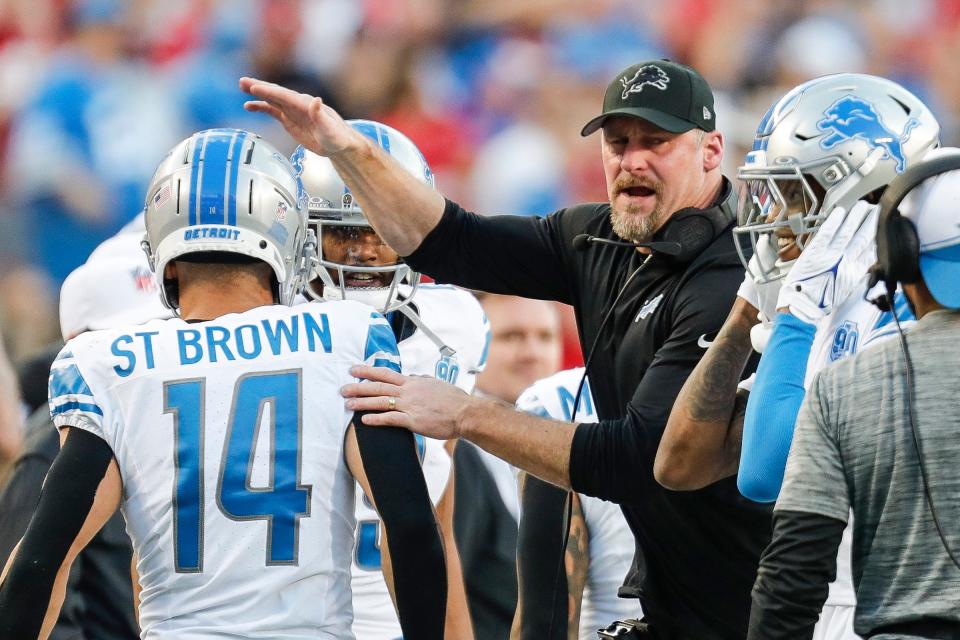Were Dan Campbell, Detroit Lions vindicated by fourth-down decisions in Super Bowl?
For anyone who loves the Detroit Lions, Sunday’s Super Bowl between Kansas City and San Francisco was a tough watch. It was hard not to imagine the Lions playing.
But, by the time the second half rolled around — somewhere near midnight, it felt like — it was easy to imagine Dan Campbell coaching ...
... and trying to figure out what he would’ve done when faced with the same, critical fourth-down choices that Kyle Shanahan and Andy Reid faced.
If nothing else, the game — won by the Chiefs in overtime — served as the Super Bowl version of what can happen — or not happen when coaches are faced with this choice in scoring territory:
Kick the field goal?
Or try to convert?
Much was made of Campbell’s fourth-down gambles against the 49ers in the NFC title game. He had win probability on his side both times, though by a fraction. What he didn’t have was conventional wisdom.

Well, Kyle Shanahan faced three similar choices. The first time he took the risk, and it worked, when San Francisco converted a fourth-and-3 from Kansas City’s 15-yard-line early in the fourth quarter — the 49ers scored two plays later to take the lead.
The next two times he went with conventional wisdom. He sent his kicker out. Jake Moody made both field goals.
Shanahan’s team still lost. In the end, his choices didn’t work.
This isn’t to say that kicking field goals in those fourth-down spots — one late in the fourth quarter and the other in overtime — directly caused the loss; they didn’t, as the defense couldn’t get a stop when it had to have it.
And, yes, the field goals kept San Francisco in the game — the first one tied it, the second one gave San Francisco a lead in overtime. Yet those field goals made it harder to win.
So, did Shanahan cost his team the Super Bowl by making those choices?
At minimum, his decision to kick the field goal in overtime opened a relatively easy door for the game’s best quarterback. Patrick Mahomes knew his team had to get at least a field goal.
That meant he would use four downs if needed, all the way down the field. And it’s hard to stop Mahomes when he gets four chances to pick up 10 yards.
WHAT TIL NEXT YEAR: Lions have fourth-best odds to win Super Bowl 59
It’s true that if Shanahan had gone for it on fourth down in overtime and his offense didn’t convert, San Francisco would’ve almost certainly lost anyway.

It’s also true that if he’d gone for it — the 49ers needed 4 yards — and San Francisco had converted and eventually scored a touchdown, Mahomes still had the chance to tie the game. If we consider that Mahomes ended up leading a touchdown drive after San Francisco kicked the field goal in overtime, then it’s a good bet he would’ve led a touchdown drive to tie the game.
But all Mahomes could’ve done was tie it. Well, unless Reid pulled a Dan Campbell and went for the two-point conversion. Here’s guessing Reid would not have.
This would’ve meant that San Francisco would’ve gotten the ball back with a chance to win the game with either a field goal or a touchdown. In fact, this is the reason Shanahan said after the game he took the ball in overtime instead of kicking it; he wanted the first chance to win under sudden-death circumstances.
Yet when faced with the fourth-down decision, he flinched, and bet that his defense could hold Mahomes to a field goal, despite knowing Mahomes would use four downs every time he needed a first down.
Maybe this wasn’t a crazy bet. But it wasn’t a safe bet.
As for his decision to kick the field goal when the game was tied at 16 with 1:53 left in the game?
Some context first: The 49ers needed 5 yards for a first; they were at the Chiefs’ 35-yard-line; they’ve got one of the best young kickers in the game; Kansas City had two timeouts.
This meant that even if San Francisco had converted the fourth-and-5, it would’ve needed another first down to make Kansas City burn its timeouts if it wanted to run the clock down and attempt the field goal to win it.
So going for it on fourth down in that moment didn’t mean setting up a field goal attempt to win the game — Mahomes would’ve had close to a minute left if the Chiefs used its timeouts and stopped the third-down conversion, forcing the field goal attempt.
CENTER OF ATTENTION: Lions C Frank Ragnow: 'I'm not retiring'
Still, going for it on fourth down there would’ve given San Francisco the chance to ice the game with one more first down and a field goal. If they didn’t convert, then Kansas City likely wins in regulation.
A 5-yard fourth-down attempt is scary, no doubt. Fail and it likely means losing. But kicking means giving the ball to the best player in the game with a chance to win.

What would Campbell have done?
With the Lions kicking game, and its defense? Campbell surely would’ve gone for it, especially the first one. Shoot, he might have gone for it in overtime, too.
He made similar choices two weeks ago in San Francisco. They didn’t work. He said he’d live with the consequences.
Sunday, though, showed that conventional wisdom isn’t a sure thing either. It is a reminder that laying blame for one choice often assumes the opposite choice is a sure bet.
It is not.
Campbell chose his gut, but he also chose his offense, and he chose math. Yet win probabilities aren’t based on certainties, like gravity, they’re based on human beings.
Shanahan made the choices in the Super Bowl so many wanted Campbell to make in the NFC title game. Yes, the scenarios weren’t precisely the same. But they were close enough.
One coach played it safe. One coach did not. Both lost.
Because no matter what choice a coach makes when the stakes are highest, someone always has to make a play.
Contact Shawn Windsor: 313-222-6487 or swindsor@freepress.com. Follow him @shawnwindsor
This article originally appeared on Detroit Free Press: Dan Campbell, Lions vindicated by fourth-down decisions in Super Bowl
